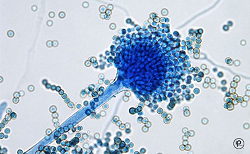Description:
Candida albicans is one of the fungal species most commonly causing life threatening infections in vulnerable patients. Our group is studying the mitochondria in Candida albicans cells.
Just like in our cells the mitochondria are the batteries of the cell, producing energy required for growth and in fungal cells can also influence infection.
The mitochondria can influence components of the fungal cell wall and its ability to infect us.
If we understand how mitochondria are influencing these factors, we can develop new anti-fungals or we can use existing anti-fungals in new combinations in order to tackle life threatening infections.
Lucian Duvenage works in Dr Campbell Gourlay’s lab at the University of Kent
Medical and Patient education videos
-
Title
Description
-

Prof. Neil Gow, University of Aberdeen
-

Chair: Prof. Peter Donnelly
Proposers: Drs. Keith Wilson (BMT Unit, Cardiff) & Vanya Gant (Microbiology, UCLH, London)
Opposers: Drs. Brian Jones (Microbiology, Glasgow) & Stephen Ellis (Imaging, Barts, London) -

Dr. Jonathan Lambourne, Hospital for Tropical Diseases, London
Dr. Subathira Dakshina, Genito-Urinary Medicine & HIV, Bart’s Health NHS Trust, London -

Prof. Paul Verweij, Microbiology, Nijmegen, The Netherlands
-

Dr. Gemma Johnson & Prof. Stephen Bustin, Anglia Ruskin University, Chelmsford
-

Dr. Chris Thornton, University of Exeter
-

Prof. Rosemary Barnes, Cardiff University School of Medicine
Dr. Mansour Ceesay, King’s College Hospital, London -

An annual clinical forum intended to provide updates on a wide range of fungal infection topics
http://fungalupdate.org/
-

Prof. David Denning, Professor of Infectious Diseases in Global Health, The University of Manchester
